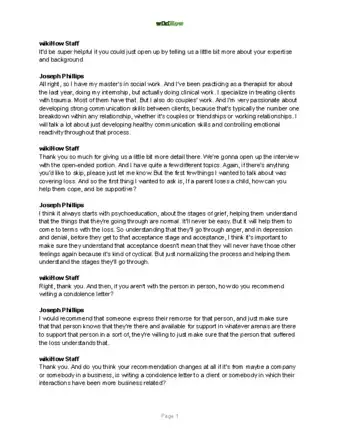This article was co-authored by Joseph Phillips. Joseph Phillips, MSW is a Clinical Therapist and Social Worker at Transformative Growth Counseling, which is based in Illinois and Florida. He specializes in relationship and attachment therapy and treats anxiety, depression, trauma, and substance use. He earned a Master of Social Work from Tulane University in New Orleans, Louisiana, and he completed his clinical internship with Transformative Growth Counseling. Joseph is also certified in disaster and collective trauma counseling.
There are 13 references cited in this article, which can be found at the bottom of the page.
wikiHow marks an article as reader-approved once it receives enough positive feedback. In this case, several readers have written to tell us that this article was helpful to them, earning it our reader-approved status.
This article has been viewed 46,109 times.
Social workers work in government agencies, hospitals, schools, and private practices to help people in need. They provide a variety of services, from helping people deal with abuse or overcome substance abuse, to aiding them to obtain housing, medical care, or education, to providing counseling or psychotherapy. They can also work to improve overall social conditions in a community.[1] It is not an easy job. In the words of one therapist, “the practitioner who denies that clinical work is grueling and demanding is… mendacious, deluded, or incompetent.” Accordingly, the most important parts of being a good social worker are making sure you are well-suited to the rigors of the job and taking proper care of yourself.
Steps
Determining if Social Work is Right for You
-
1Be sure you have the personality of a good social worker. Social work can be a very demanding job. You are constantly interacting with people in need, and often despite your best efforts, you are unable to help them due to social factors or your clients’ own resistance. Those who succeed as social workers tend to share common personality traits:[2]
- Empathy – You must be caring and understanding of those who come to you for help.
- Patience – You must work through problems at your clients’ own speed.
- Dependability – You must be there for your clients when they need you if you are going to earn their trust.
- Organization – Because you will often be dealing with a heavy caseload, the ability to prioritize and manage multiple projects efficiently is key. Giving yourself time for breaks also can help you feel less overstimulated.
- Perceptiveness – You will be dealing with topics that are difficult to talk about like abuse. More than just being a good listener, you need to be able to read between the lines to get at what your clients’ want to tell you, but are often afraid to say.
- Objectivity – Becoming too emotionally involved can both drain you and make you less effective. Even while being empathetic, you must maintain the emotional distance necessary to be effective.
- Persistence – Continually overcoming setbacks is the nature of the job. Perseverance is vital.
- Flexibility – Social work is not always a 9-5 job. The best case workers have the flexibility to help their clients when they need them most.
- Resilience – You will see the worst in humanity and face heart-rending problems every day. You must be resilient in order to last in the job. This means knowing how to take care of yourself and recharge your batteries when not working.
-
2Realize that you cannot help all your clients. People go into social work hoping to change the world and improve lives, but things rarely go as smoothly as that. You will have clients who have been mandated to see you and those who do not want to be there. You will have clients who miss more appointments than they attend. You will have clients who do not want to change. You will have mountains of paperwork that take up more of your time than your clients. Being a social worker means dealing with frustration, pushing disappointment aside, and being able to celebrate small successes.[3]
- Talk with your colleagues – Don’t be afraid to tell them about your disappointments and frustrations; they no doubt have them too. Knowing you are not alone can help you deal with frustration.[4]
- Do not blame your clients – They might miss meetings. They might not do as you ask. They might even lie to you. Blaming them will not help you, or them. They are dealing with huge problems. Remind yourself of that every day. It is the problems to blame, not the clients.[5]
- Focus on problems you can control – Of all the problems you face, some you have total control over solving (e.g. when you do your paperwork or how your write up your reports), some you have limited control over (e.g. your schedule), some will be totally out of your control (i.e. whether a client shows up), and some will be so confusing you can’t even figure out what the problem is (e.g. office politics; managerial incompetence). The key is to focus on the things you can control or influence, and to recognize you cannot control the rest and let it go.[6]
Advertisement -
3Get experience in your chosen area as soon as possible. There is no better way to see if social work is right for you than to actually do social work. You should get an internship or begin volunteering before or shortly after you start the education required to be a social worker.
Excelling and Surviving as a Social Worker
-
1Get support. Social work is a demanding job, and to excel you’ll need professional and social support. This support will both keep you sane and help to progress your career.
- Join professional organizations such as the British Association of Social Workers or the National Association of Social Workers in the U.S. in order to take advantage of conferences, workshops, and mentoring.[7]
- Develop helping relationships with peer groups, spouses, or friends. Interpersonal relationships are key to helping social workers deal with their own distress.
-
2Take care of yourself. If you are interested in social work, you are probably an empathetic person, which means that many of your clients’ problems will impact you emotionally. Their disappointments and failures can all too easily feel like your own failures. It is important to make time for yourself – reading, laughing, being with your family – whatever you need to recharge so that you can face your clients’ problems anew.[8] Self care is basically a requisite within the social work field, since you must take time for yourself when doing stressful work. Some clinically tested strategies of self-care include:
- Self-Evaluation – The ability to effectively monitor one’s own condition has been cited as the number one trait of effective therapists. This means both using introspection and being attentive to interpersonal feedback, such as a family member or colleague noting that you look tired or are working longer hours.
- Creating a Pleasant Work Environment (aka stimulus control) – Changing one’s environment is a proven way to impact one’s mood. There are a variety of steps one can take: get a comfortable chair; play calming music while writing up reports; put plants in your office; take time to talk to colleagues; don’t eat at your desk; etc.
- Relaxation, Exercise, and Diversion (aka counter conditioning) – These are activities that replenish you physically and psychologically, and they are vital to success as a social worker. Typical activities include: reading or watching TV; working out; hobbies; vacations; meditation; worship; volunteer work; and keeping a diary.
-
3Seek out personal therapy. The psychological perils of social work are many: compassion fatigue, burnout, and unchecked counter transference (taking up your clients’ pain and trauma as your own) among them. Spending time with a therapist has been shown to help mitigate these problems, resulting in both an improved personal life and better professional development for social workers.[9] [10]
-
4Set boundaries. When facing people who are dealing with huge problems like abuse or addiction, there is an understandable temptation to pour more and more of your time into helping them. However, to avoid burning out and to maintain one’s own mental health, a social worker must learn to set boundaries both on the time they devote to each case and on the milestones they hope to achieve.[11]
- Create a realistic care plan – Don’t try and fix a client's problems overnight. If you create a reasonable care plan with small intermediate goals, you will have a road map to stick to and be less likely to pour time into seeking an immediate solution.
- Be wary of devoting extra time to particular clients – While some clients do require more work, treating one client differently than others is often a sign that your boundaries – both in terms of time and your emotional relationship with the client – are overextended.
- Limit client communication – Always use your organization's process for communicating with clients. Allowing a client to contact you directly leaves you out of control of your work schedule and, if you are unable to respond when needed, may create a loss of trust. In the case of a crisis, your clients should be directed to the emergency services.
- Discuss your workload with your supervisor – Speaking regularly with your supervisor about your workload and particularly difficult cases can help manage your caseload and set boundaries. Know that working extra will not help your organization, it will only set unrealistic expectations for your fellow social workers.
-
5Learn from assessments. As a social worker, you should have your own work assessed on a regular basis. Instead of dreading these assessments, use them as a tool to improve the services you offer.
- Clarify vague terms – If your manager offers vague advice with no clear indication of how to enact it (e.g. use your time more efficiently), ask him or her to clarify or provide a series of clear steps.[12]
- Bring your own questions – Managers are more likely to give candid feedback if you ask for it. So ask a general question – “What two things do you think I can do to most improve my work?” – or ask about areas you think need strengthening, such as “Can you recommend a strategy for dealing with all this paperwork?”[13]
- Make a plan – After any performance review, take time to write down your manager’s recommendations or areas where you are underperforming, and then make a step by step plan for how to enact the recommendations or improve your performance. Consult your manager or colleagues as needed in creating your plan.
-
6Diversify your professional activities. Doing the same social work over and over again can be depleting. Diversifying the type of work you do has been shown to improve both personal mental health and professional output.
- Conduct multiple forms of therapy: individual; couples; group
- Work with different types of problems
- Work with different types of patients: ethnicity; age; social background; profession
- Try teaching, researching, or learning alongside counseling
-
7Continue learning. Your degree qualifies you to be a social worker, but it definitely doesn’t teach you everything you will need to know. Good social workers keep learning as they go, whether that means pursuing another degree, taking courses or attending workshops, or doing research on your own as issues come up.[14]
-
1Gather information in order to assess your clients’ situation. This is an ongoing process that takes place during interviews with the client. It requires actively listening to your client and being open to verbal and nonverbal information, as well as input from colleagues and other members of the client system. Common areas addressed during assessment include:
- Motivating factors in seeking your services
- Living arrangements, including the safety of the home environment
- Vocational history
- Cultural values and beliefs
- Family composition and potential support offered by family
- Barriers to the client’s use of community resources
- Client’s coping styles
- Client’s perception of the needed changes
-
2Set priorities and goals. Based on the assessment, work with the client to set achievable goals to address their situation. For a client who is homeless, such overarching goals might include overcoming substance abuse, getting a job, and then acquiring housing.
-
3Implement a plan to achieve the client’s goals. The plan should translate the client’s goals into specific objectives and the steps needed to achieve those objectives. Resources available to help the client should be noted, and a schedule created to measure progress. Such plans often include:
- Education and coaching in life skills
- Individual, couples, and group counseling and psychotherapy
- Mediation and conflict resolution
- Advocacy on behalf of clients
- Resource information and referrals (often including financial, housing, legal, and medical resources)
- Planning for the termination of services
-
4Advocate for your clients. Part of the job of a social worker is to advocate for his or her clients’ access to services, including securing funding, educating the public and lawmakers regarding the need for resources, and addressing service gaps and discrimination that present barriers to clients.
-
5Work with other services and organizations. To ensure the best outcome for your clients, it will usually be necessary to work closely with other organizations – hospitals, schools, doctors, work training centers, etc. – that provide services that are helpful to your client.
-
6Keep a record of your case activities. Keeping an up-to-date record of each case is important in allowing you to manage your caseload, in ensuring that another social worker will be able to easily step in if the case is transferred, in coordinating services for your clients, in arranging for service reimbursement, and in providing support for case work managers in the event of legal review.
Community Q&A
-
QuestionI would like to know the therapies used in social work and their applicability?
 Community AnswerA good social worker always gives the first preference to her client, and is happy to make her client become independent by following the schedule of their progress and growth.
Community AnswerA good social worker always gives the first preference to her client, and is happy to make her client become independent by following the schedule of their progress and growth. -
QuestionWhat subject can I do to get this job?
 Community AnswerTypically, you would get a bachelor and/or master's degree in social work. Then you have to obtain a license. See How to Become a Social Worker
Community AnswerTypically, you would get a bachelor and/or master's degree in social work. Then you have to obtain a license. See How to Become a Social Worker
Expert Interview

Thanks for reading our article! If you'd like to learn more about social work nuances, check out our in-depth interview with Joseph Phillips.
References
- ↑ http://www.socialworkdegree.net/traits-of-successful-social-workers/
- ↑ http://www.socialworkdegree.net/traits-of-successful-social-workers/
- ↑ http://www.socialworker.com/feature-articles/career-jobs/Tips_for_New_Social_Workers/
- ↑ http://www.socialworkdegreeguide.com/faq/how-can-social-workers-combat-work-burnout/
- ↑ http://www.socialworkhelper.com/2013/03/08/when-the-hope-of-a-social-worker-is-gone/
- ↑ http://www.psychologistanywhereanytime.com/emotional_problems_psychologist/pyschologist_frustration.htm
- ↑ http://www.theguardian.com/careers/success-social-work-career-getting-started
- ↑ http://msw.usc.edu/mswusc-blog/10-skills-every-social-worker-needs/
- ↑ http://ir.uiowa.edu/cgi/viewcontent.cgi?article=1201&context=etd
- ↑ http://www.socialworker.com/feature-articles/field-placement/What_I_Wish_I_Had_Known_Burnout_and_Self-Care_in_Our_Social_Work_Profession/
- ↑ http://msw.usc.edu/mswusc-blog/10-skills-every-social-worker-needs/
- ↑ http://www.northwestern.edu/hr/workplace-learning/performance-excellence/getting-the-most-from-your-performance-review.html
- ↑ http://www.forbes.com/2010/11/17/performance-review-pay-promotion-leadership-careers-advice.html
- ↑ http://www.rasmussen.edu/degrees/justice-studies/blog/things-you-need-to-know-before-becoming-social-worker/















































































